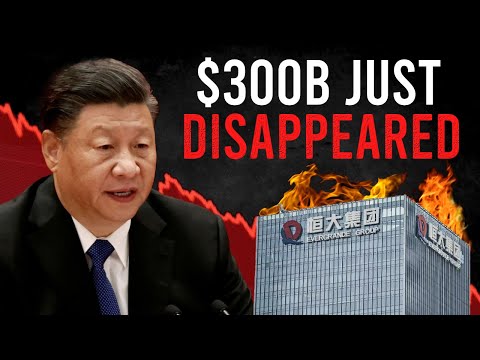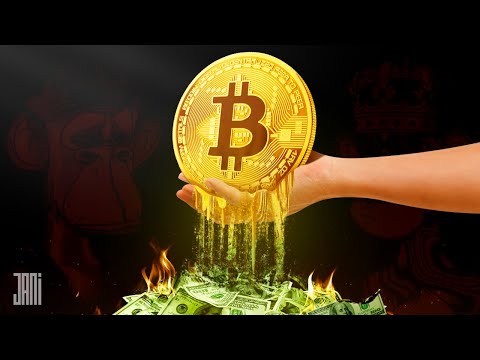China's ENTIRE Economy Will Collapse In 34 Days

- Social unrest has erupted in China after almost $6 billion worth of deposits froze up. Thousands of police were deployed to shut down the protest. Following the protest, hundreds of thousands of Chinese homebuyers refused to pay up to $300 billion worth of mortgages. Mortgage payments have reportedly stopped on 301 projects in 91 cities. China is experiencing a repeat of the 2008 recession, but on a whole new level. An entire
social revolt is growing as the CCCP desperately tries to censor the growing uneasiness. Internal government meetings have revealed substantial stress within the CCP, and the signs are showing that it's only going to get worse. China's social unrest has revealed a multitude of flaws within the country and the implications will ultimately affect the rest of the world. Over 400,000 Chinese citizens witnessed their bank deposits freeze recently. When depositors went to the ATM to withdraw their money, their withdrawals were simply declined.
Panic ensued after people couldn't even withdraw their own money. The bank freeze was a result of a massive fraudulent scheme that played out for over a decade. Protests about the bank freeze have gone viral on Chinese social platforms, despite repeated attempts from the CCP to censor them. While the bank freeze only occurred within five different banks, according to the Chinese government, hundreds of other Chinese banks are at risk. After the bank protests went viral,
the social unrest spread to almost every part of the country. A recent internal government property meeting leaked several major concerns. 300 million square footage of property construction has been halted. Local governments can no longer withstand the pain. A 200 to 300 billion yuan property fund has been rumored to not be enough. Property sales are down 20%. Construction starts are down 30%. Perhaps the worst of them all is China's recent mortgage revolts. Because Chinese homebuyers are not paying their mortgages, financial regulators have created a proposal to allow citizens to pause their mortgage payments. The amount of unpaid mortgage payments equals to 2 trillion yuan
or $300 billion. The problem with both the mortgage boycott and the bank freeze is that a domino effect is about to occur. Five banks went bankrupt, which will spread into 20 banks, then 100, and eventually, the entire banking system. This is because like almost every
country's financial infrastructure, the Chinese banking system relies on fractional reserves. When someone deposits $1,000 in the bank, the bank does not hold onto that $1,000. The bank will instead keep $100 as reserves and loan out $900 so that they can receive income through interest. The lender of that $900 will then spend $900 on products and services.
Because one man's spending is another man's income, someone else will receive that $900 as income and deposit it into the bank. The bank will now loan out $810 and keep $90 in reserves. The lender of that $810 will then spend $810. Someone will receive $810 as income and deposit it into the bank. This will cause the bank to loan out $729 and keep $81 in reserves. This cycle will keep going on over and over again causing the bank to be leveraged up by up to 10 times. This is called the monetary multiplier effect because the lending is multiplied over and over again.
In the example that we looked at the money supply started at $1,000 and eventually increased to $10,000. $9,000 was created out of thin air purely from the multiplier effect. When citizens all try to withdraw their money at once they will quickly realize that the banks don't actually have the money they deposited. This is because the banks simply created money out of thin air. Economists worldwide know that China's recent social unrest is a signal of a complete disintegration of the Chinese economy. The mortgage boycott did not come out of nowhere. It took years of mismanagement and greed to build up all of the frustration that came in the form of a boycott. Because housing prices kept going up year after year, Chinese citizens were eager to purchase any property on the market. Similar to the buildup of the US's 2008 recession, citizens could not even imagine that housing prices would ever crash. As a result of increasing housing prices, people would save up
for years just to get their hands on real estate. An estimated 70 to 80% of Chinese household assets are tied to real estate. Imagine saving up for decades just to finally purchase a single property. This type of behavior was incentivized by Chinese culture where newer generations would prioritize purchasing a home. Such a huge buying frenzy filled up the booming property market that
continued on for decades. Property developers saw this greed as an opportunity to expand faster. This is where the pre-sale model came into play. The property pre-sale model was when buyers put down a deposit to start paying mortgages on unfinished houses. That's right. Home buyers were paying for mortgages for houses that weren't even built yet. Anyone in their right mind would know not to do that but in the frenzy of the housing bubble, it made a lot of sense for citizens to buy pre-sale houses. Prospective home buyers thought that housing prices would continue increasing.
They were concerned that by the time the property would be finished, the price would've already increased substantially. To purchase properties at a lower price home buyers would take on the risk of buying in the pre-sale round. According to the Chinese National Bureau of Statistics 34.5% of the property development income came from pre-sales. Property developers would then take the income from the pre-sale round and use it to sell even more pre-sale homes. Just like a Ponzi scheme,
this model worked incredibly well while house prices kept increasing. However, the moment that buyers became skeptical, the entire pre-sale model collapsed. The property developers would usually give a timeframe that detailed exactly when the property would be finished. When the developers began failing to deliver on the timeline home buyers lost trust in the developers. Because property developers would usually use the money from the pre-sale round to
sell more pre-sale homes, they didn't actually have the money to buy the houses. In the past, they would simply just use the money from newer pre-sales to fund the construction of older pre-sales. This is similar to a Ponzi scheme where fund managers use new investments to pay off previous investors. A Ponzi scheme only works when the sponsor can constantly attract new capital. Once a Ponzi scheme can no longer bring in new investors, the older investors cannot get paid anymore. This is similar to what happened to the Chinese housing market. New home buyers already paid for the pre-sold houses but the developers don't have the money to finish building them. Even before the boycott happened, it was already common practice for property developers to fail on delivering pre-sold homes. According to Japanese financial service company, Nomura Holdings,
only 60% of pre-sold homes between 2013 and 2020 were actually built. Despite the obvious signs of a Ponzi scheme, the bubble continued to grow until recently. In late June of 2022, a petition on social media was signed by 900 buyers. The petition was in relation to the property developer Evergrande, which was the biggest property developer at the time. According to Fortune China 500, Evergrande is pulling in 500 billion yuan or $74 billion in annual revenue. That's right, $74 billion. The petition was a plea to the local government by pre-sale home buyers. If Evergrande
would not resume construction within three months, the home buyer's petitioned to stop paying the mortgage payments. At the time, the petition seemed like nothing to the massive property giants. Unbeknownst to Evergrande at the time, the movement would continue growing to 301 projects in 91 cities. The boycott first began in the Henan province before spreading to Hunan, Hubei, Shaanxi, Hebei, and several other provinces. Even though the three months are not over yet, banks are already reporting missing mortgage payments. China has been desperately trying to
censor the movement but doing so has only made it grow even more. Because videos like this are constantly shut down or shadow banned by YouTube and the CCP, please take a moment to hit that like button. It helps more people know about the truth by boosting this video in the YouTube algorithm. Also, please hit the subscribe button as well for more videos like this. I really appreciate your
support because without people like yourself, the CCP will shut these videos down. The protest is actually quite surprising because Chinese citizens have historically paid off most of the mortgages. Not only that, but banks are legally entitled to ask and receive the full payment.
Despite the cultural traditions and illegality, the government has allowed citizens to pause their payments temporarily. China has also cut the mortgage interest rate several times this year. In May of 2022, the government cut the five year loan prime rate from 4.6% to 4.45%. The CCP has also removed lending restrictions on property developers. Such a move is like printing more money to solve inflation. By removing lending restrictions, developers will only continue to loan even more money to pay off previous loans. It's safe to say that with this type of management
the unfinished properties are never going to see the light at the end of the tunnel. Imagine properties across China being stopped halfway through construction. If every home buyer were to default on unfinished properties $58 billion in loans would disappear. Economists expect this fear to spread within the property sector and affect trillions of dollars worth of mortgages. An executive at a property developer anonymously told Reuters, "After repaying bank loans with the money left, if there is any, it's almost impossible also to repay the onshore and offshore bonds."
With the Ponzi scheme exposed, property developers don't have the money to pay back their debt. This could be manageable in normal circumstances but the Chinese government is being hit with several swords at once. During the bank scam in the Henan province, the Chinese government was exposed step by step. Every manipulative move by the CCP was in the pursuit of restricting social panic, but instead of doing so, they only exacerbated the tension. In order to demonstrate how frightening the CCP is, I'm going to go over what happened to Ye Mijian. On June 16th, 2022, Mr. Ye arrived at the city of Zhengzhou where several local banks froze his and his friends' deposits. The plan was
simple. Mr. Ye and his friends would protest outside of the banks to try and get a refund. The problem was that Mr. Ye did not foresee the ruthlessness of the Chinese government. Upon exiting from the train station, his health code suddenly switched from green to red.
The health code is a system that is supposed to indicate whether or not you have COVID. The green health code is given to those who have tested negative for COVID within the past 72 hours. The red health code is given to citizens who tested positive for COVID and need to be isolated.
Mr. Ye never tested positive for COVID but he still received a red code. Despite the obvious manipulation, local officials prompted Mr. Ye to leave the region for isolation. Two days after being isolated in a hotel, Mr. Ye's health code code suddenly flipped from red to green. The
typical COVID isolation period lasts for about seven days, but Mr. Ye's code flipped from red to green after only two. Mr. Ye's health code was clearly manipulated to shut down his protest. Although he may only be one person, Mr. Ye's experience is representative of over a thousand bank depositors that tried to protest. The frightening part about this was that it wasn't the
first time that it happened. In May of 2022, Mr. Ye was confined in the same hotel after protesting outside of the bank's local headquarters. Mr. Ye explained how, "last time we were taken here after we managed to stage a street protest. This time, I couldn't move an inch." While the strategy of changing the health code worked at first, people eventually caught on to the blatant manipulation.
Five Chinese officials were eventually fired. This was a major loss for the Chinese government because the bank depositors would eventually protest again. On July 10th, protesters grouped up at four rural banks that held $5.9 billion in frozen deposits. The protest understandably garnered national attention on social media platforms. In response
to the protest, the government has decided to pay back citizens who lost up to 50,000 yuan, which is about $7,500. Most citizens deposited their life savings due to a false perception of safety. Bank deposits up to 500,000 yuan are supposed to be insured by the government but that insurance doesn't cover fraudulent schemes. In the case of the banks in the Henan province, depositors were defrauded by the owner of Henan New Fortune. Henan New Fortune allegedly
defrauded the banks by illegally transferring funds and falsifying loans. Instead of lending out money to citizens, Henan New Fortune would just take the money for themselves. Because the activity was fraudulent, the deposits didn't qualify for government insurance. But this begs the question, how were citizens supposed to know that the banks were involved in fraud? Some might claim that the depositors should have done their own due diligence but how are they supposed to spot the scam when the fraudsters are literally hiding it? The bank protest has caused depositor's nationwide to be skeptical of all banks, and rightfully so.
When it comes to international investors nobody wants to invest in the Chinese economy anymore. From the month of June to July, the number of Chinese junk dollar bonds trading below 20 cents doubled. If you watched my previous video, you would know that China is trying to get its COVID cases down to zero. That's right. Zero.
China's strict COVID target of zero COVID cases is still continuing to take place. After finding four asymptomatic COVID cases in Wuhan recently, 1 million residents were locked down for shelter in place. The CCP has gone completely hysterical about their goals. Venture capitalist, David Sacks, believes that this hysteria is coming from President Xi himself. - On zero COVID, I think this is coming directly from Xi. This is his policy. And I think that earlier in the pandemic, they were hailing their response, which they saw as orderly and effective at controlling COVID, and they were contrasting that with the chaotic Western response. And so, I think that the credibility of the
CCP and Xi himself got tied up in this idea of stopping COVID entirely, of zero COVID. And so, I think this is coming directly from the top and it's having a huge impact on their economy. And I think this is one of the dangerous aspects of an autocratic system is you got one guy at the top making the decisions, and if he's wrong, there's not really a great feedback loop- - And nobody can question him. Yeah.
- Yeah, exactly. So- - There's no questioning the God king. - Sacks got interrupted at the end, but he was still able to lay out the clear issue with authoritarian governments. Nobody has the power to stop the stupidity of the government
when the dictator has all the power. Perhaps the CCP success over the past few decades has made President Xi delusional. This isn't the first time that dictators have made terrible unilateral decisions. Sacks recalls a Chinese emperor who banned ship building 500 years ago, which caused Chinese progress to lag in comparison to the West. - I think this was about 500 years ago. There was a Chinese emperor who banned ship building and
banning having a Navy. And because of that, China shut itself off from global trade and it fell well behind the West, which then explored and captured the New World. There's this question about, you know, Chinese culture and civilization was much more advanced than the West or than Europe a thousand years ago but basically it fell behind and a big reason is because this unilateral decision by one emperor to basically close themselves off from the rest of the world. So you have to wonder, does this autocratic move by Xi
basically doom their economy to a recession? It seems like they're not learning from our experience. These lockdowns didn't work. I mean, you can't stop the virus. It's eventually gonna get out. Even I saw Biden got the virus this week. I mean, it's out. - As if President Xi couldn't get even more hysterical, his recent meeting with Biden threatened control over Taiwan. Xi told Biden that China will safeguard its "national sovereignty and
territorial integrity" over Taiwan. This is a signal that China is trying to block out foreign companies from its territory. We're already seeing the effects of this. Jeep recently closed its single factory in China after the CCP kept interfering with its business. The CEO of Stellantis, which is an auto conglomerate that owns Jeep, explained how "we have been seeing over the last few years more and more political interference in the world of business in China.
We have two big competitors, Volkswagen and GM, who are very present in China. I wouldn't want to be in their place." Even Chinese citizens are beginning to rethink their citizenship in China. The former founder and CEO of Alibaba, Jack Ma, recently gave up his control of Ant Group to gain back his freedom. Instead of being trapped in China, Jack Ma has recently been touring Europe. But Jack Ma isn't the only one. An estimated 10,000 wealthy Chinese citizens worth $48 billion are planning to leave China this year. This means that when it comes to losing their most wealthy individuals, China is almost on the same level as Russia. Russia has roughly 15,000 high net
worth individuals that are looking to migrate out. This migration is occurring despite the numerous institutional barriers that exist when it comes to leaving China. These barriers include receiving government approval, getting a Visa from the other country, and securing the paperwork. It's
not a surprise that people want to leave China. The property market is sinking to new lows as the economy is weakening. Remember Evergrande, the world's most indebted property developer? Evergrande recently missed its deadline for its $300 billion debt restructuring plan. Despite
the many months that Evergrande had to prepare, sources close to Evergrande bond holders say that the company hasn't even started. There is simply no way for Evergrande to restructure its debt. They can continue selling more properties - but who is going to buy them? If they try to raise money, nobody's going to invest. But more importantly, nobody's going to buy their new pre-sale houses. Not only does China have too many empty houses but their population is also shrinking at a rapid rate. The population decline is a result of China implementing restrictions on the number of children that people could have. In 1979, the One-Child Policy came into effect,
which limited Chinese families to one child each. When the government realized that their population would shrink dramatically, the Two-Child Policy was enacted in 2016. The One-Child Policy still haunts citizens to this day, and as a result, China is set to face a serious population decline.
- The birth rate or the fertility rate in China slipped to just 1.15 in 2021, so last year. It takes 2.1 just to maintain your population or replacement level, and this is lower than even Japan, which is also shrinking. Japan's up to 1.3. The US and Australia
are at 1.6, but we get above 2.1 because of immigration and China doesn't have that. So, they've got a huge demographic problem. To Chamath's point, it's gonna be something like... Well, the population is shrinking by 40% with every generation. That's what these numbers imply. - Insane.
- The numbers are it's gonna be under 600 million by the year 2100, but I don't understand how it wouldn't even be less than that if it keeps going at this rate. The commentator, Peter Zeihan, I don't know if that's the right way to pronounce the name, Peter Zeihan or something. Anyway, he's pointed out that China is facing demographic collapse in the next decade or so. - China is dealing with several major issues right now, but all of them would eventually resolve over the long term if the government played their cards correctly. It doesn't seem like that will be the case because the government is moving back towards a more socialist structure, which is historically terrible for economic growth. There's no way for the Chinese economy to be saved at this point. China's economy is set to enter one of the worst downfalls in history.
The social unrest may continue to grow, and if that's the case, citizens may revolt against the CCP. This video is just one of many videos on my channel that uncover China's incoming downfall. So hit that subscribe button so that you don't miss out on my next video covering the latest updates on China. If you enjoyed this video, please hit the like button as well. Thank you for all of your support and I'll see you in the next one.
2022-08-09 16:45


